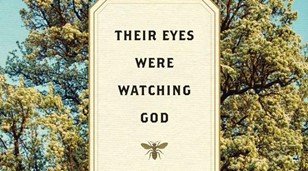While having a fascinating and meandering conversation during a book group in which we were discussing How To Be An Anti-Racist by Ibram X. Kendi, someone commented that Their Eyes Were Watching God was the best book she’d ever read. I was sort of dumbstruck. Not only had I never read the book, I’d never even heard of it. I immediately ordered it from the library, and indeed reading it was transformative for me.
Written by Zora Neale Hurston, Their Eyes Were Watching God was originally published in 1937. It was then somewhat forgotten until after the author’s 1960 death when she was rediscovered by a number of black authors and reintroduced to a greater readership by Alice Walker in her 1972 Ms. Magazine essay “In Search of Zora Neale Hurston”. A republication ensued and it is now considered a seminal novel of American fiction. The fact that it was out of print for the thirty-five years spanning from 1937 until 1972 speaks volumes about silenced voices and the shaping of the American narrative. The loud voices of some, and the silencing, marginalizing, and “cancelling” of others continues. Reading this brilliant story highlighted for me the importance of seeking the quieter voices often hidden from our view.
A great deal of Hurston’s book is written phonetically in an African-American dialect, and I’m quite certain I’d never read a book where the culture manifested so strongly through the language itself. The book is a poetic, graceful love story, rooted in black folk traditions and steeped in mythic realism, and it celebrates, boldy and brilliantly, African-American culture and heritage. Most importantly, it pays tribute to a black woman, who, though constricted by the times, still demanded to be heard.
The story was gripping as in it we travel with Janie Crawford in her 1930’s journey from that of being a free-spirited girl to a woman of independence and substance. Janie marries three times, first when she was only sixteen years old and her dying grandmother married her off in an effort to ensure Janie would be cared for after her own death. Janie’s second marriage was an escape from her unhappy first, and although it began as an adventure it ultimately turned into an oppressive relationship, and when her husband died Janie had some sadness, but mostly relief. Although her second marriage had given her financial security, it had left her emotionally bankrupt. As a result, after the death of her husband she embraces her personal freedoms, feels unbound by societal expectations and is not looking for a third marriage. Instead, she feels unchained and free to look within herself to find her own happiness. And in so doing she ultimately meets an unconventional man who rekindles her childhood joy. She surprises herself by wanting to marry again, this third and final time to a partner who is her true mate. At this point in the story and through the rich language Hurston uses, Janie seems to literally break apart her own chrysalis and reveal her essential self.
When recently I attended (virtually of course) a Heading Home event a woman named Dugana spoke about her journey from homelessness to coming home. She talked about her “shero”, Maya Angelo, saying her words gave Dugana inspiration, motivation and courage in her darkest moments.
Though it’s been eighty-four years since Hurston adapted her grandmother’s story of struggle, Dugana, like Janie, is evolving and becoming in a world where despite having had her voice muted, she is demanding to be heard, phenomenally so.

